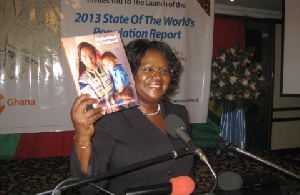- Home - News
- TWI News | TV
- Polls
- Year In Review
- News Archive
- Crime & Punishment
- Politics
- Regional
- Editorial
- Health
- Ghanaians Abroad
- Tabloid
- Africa
- Religion
- Election 2020
- Coronavirus
- News Videos | TV
- Photo Archives
- News Headlines
- Press Release
Health News of Friday, 20 December 2013
Source: GNA
Motherhood not the only destiny for girls - Report
The State of the World Population 2013 report has called for a shift away from interventions that make girls see motherhood as their only destiny.
The report says broad-based approaches that build girls’ human capital, and help them make decisions about their lives including sexual and reproductive health, and offer them real opportunities must be promoted.
The report that was launched in Accra on Friday explained that the new approach must also target the circumstances, conditions, norms, values and structural forces that perpetuate adolescent pregnancies on one hand, and that isolate and marginalise pregnant girls on the other.
The report published by the United Nations Population Fund (UNFPA) was launched under the theme: “Motherhood in childhood: facing the challenge of adolescent pregnancy,” and highlighted the main challenges of adolescent pregnancy and its serious impacts on girls’ education, health and long-term employment opportunities.
It said 20,000 girls below 18 give birth in developing countries every year while nine of these births occur within marriage or a union.
Girls under 15 account for two million of the annual total of 7.3 million new adolescent mothers, the report noted; and added that if the current trend continues, the number of births to girls under 15 could rise to three million a year in 2030.
Dr Bernard Coquelin, UNFPA Country Representative said today’s adolescent and youth are 1.8 billion strong and make up a quarter of the world’s population, and these young people have high expectations for themselves and their societies, and are imagining how the world could be better.
He said of particular interest is what the challenges of adolescent pregnancy are and also what could be done to ensure girls have a health and safe transition into adulthood.
Dr Coquelin noted that in many parts of the world, adolescents, especially girls, are taken out of school, coerced into unwanted sex, subjected to early and forced marriage, bear unwanted pregnancies, experience unsafe abortion or become infected with HIV.
He noted that adolescents and youth, particularly in Ghana, must be given the opportunity to find solutions to their own problems since they represent a formidable proportion of the nation that could not be underestimated.
He said the UNFPA would want to initiate a mentorship programme in the coming year where many women of substance would “reach out to these young ones as their mentors to support programmes and interventions that would enhance young people’s health, education and livelihoods”.
Mrs Justice Barbara Ackah Yensu, Justice of the Appeal Court who represented the Chief Justice, Mrs Georgina Theodora Wood, said the issue of motherhood in childhood is of grave importance for development globally, but especially for developing countries like Ghana in terms of population management.
She said since few young people receive adequate preparation for their sexual lives, it leaves them potentially vulnerable to coercion, abuse and exploitation, unintended pregnancy and sexually transmitted infections including HIV.
She said statistics conducted by Ghana Health Services in 2012 on teenage pregnancy revealed that about 750,000 teenagers from 15 and 19 years become pregnant in Ghana, and for the same year, close to 14,000 teenagers in the Central Region got pregnant, indicating a tremendous 62 percent increase in the region over the previous years.
Mrs Ackah Yensu mentioned the leading causes of teenage pregnancies as gender inequality, lack of access to education and reproductive health services, and poverty as well as child marriages.
She therefore called on governments, international organisations, civil society groups, communities, families, religious leaders and adolescents to work together in effecting change and reshaping “our norms and traditions”.
“Interventions that have power to reduce the vulnerability to early pregnancy, especially among the poor and least educated and marginalised girls should be implemented and not just touted by governments,” she said.
She also advised girls to aspire to the top by attaining higher education, gain employment before giving birth and in turn educate their own children











